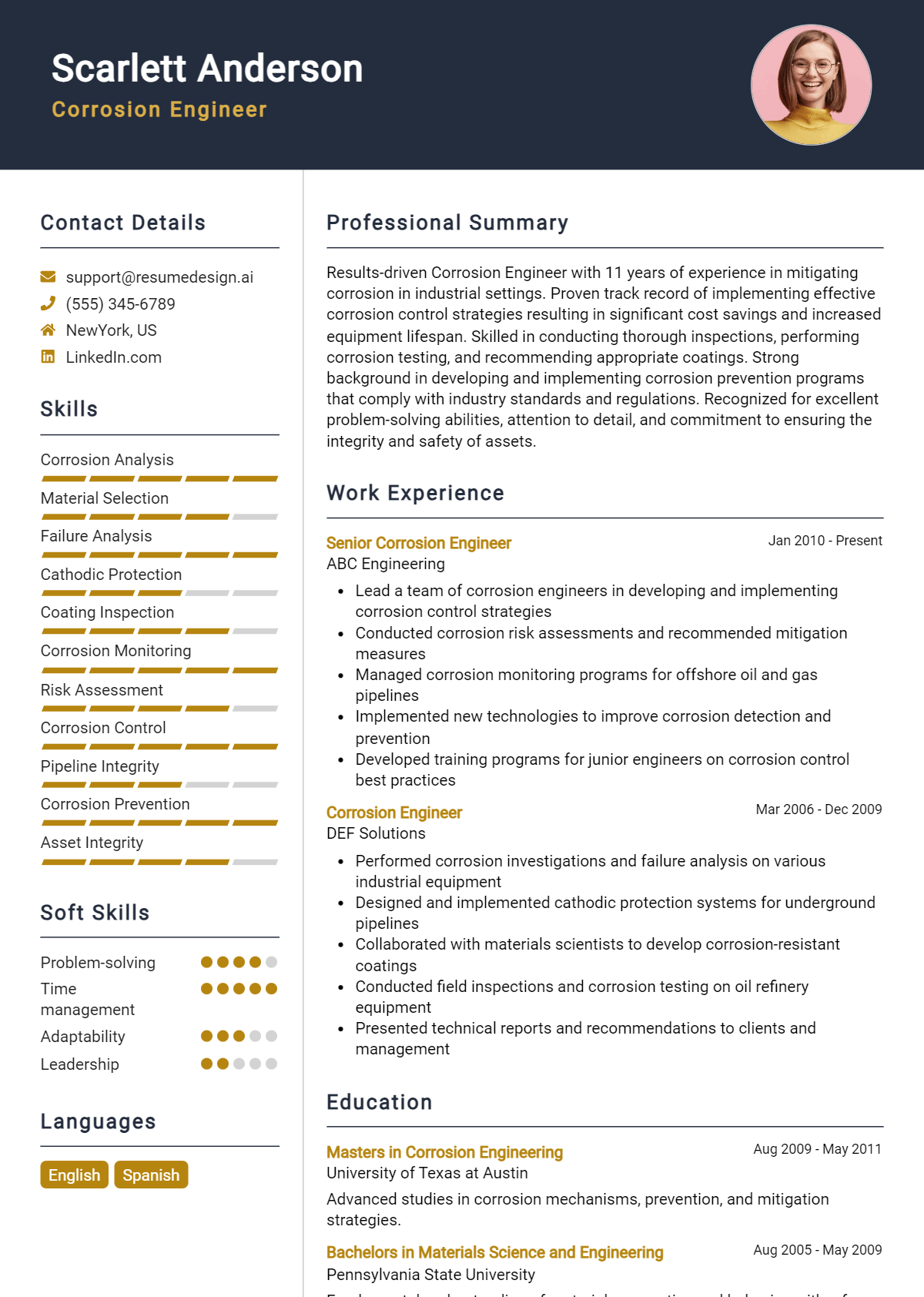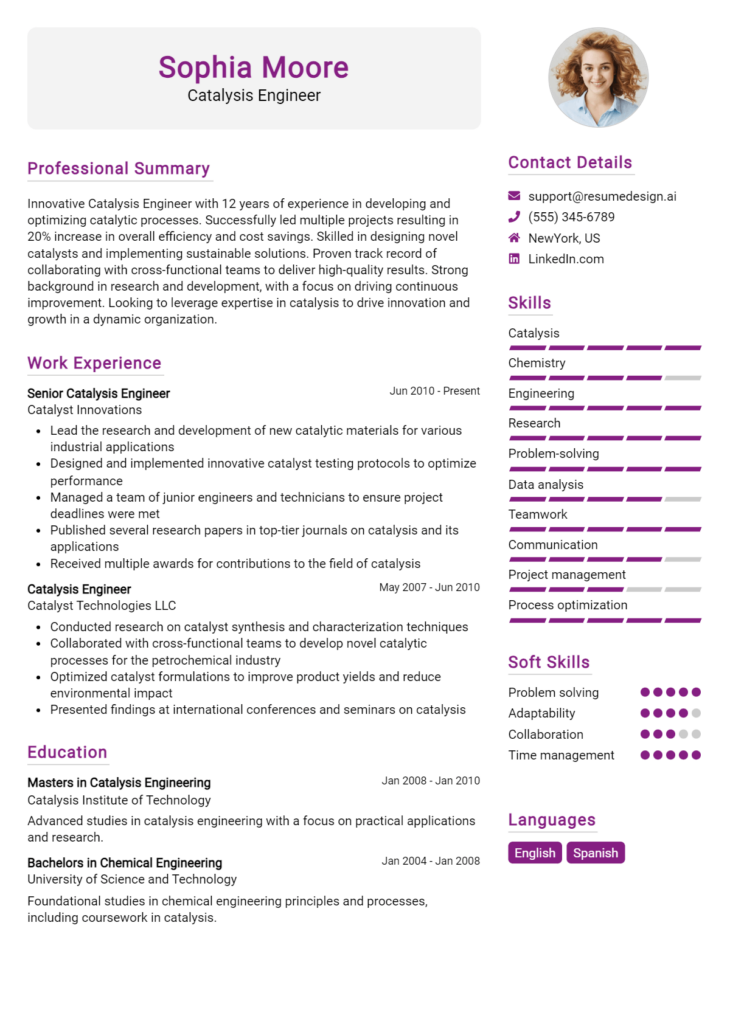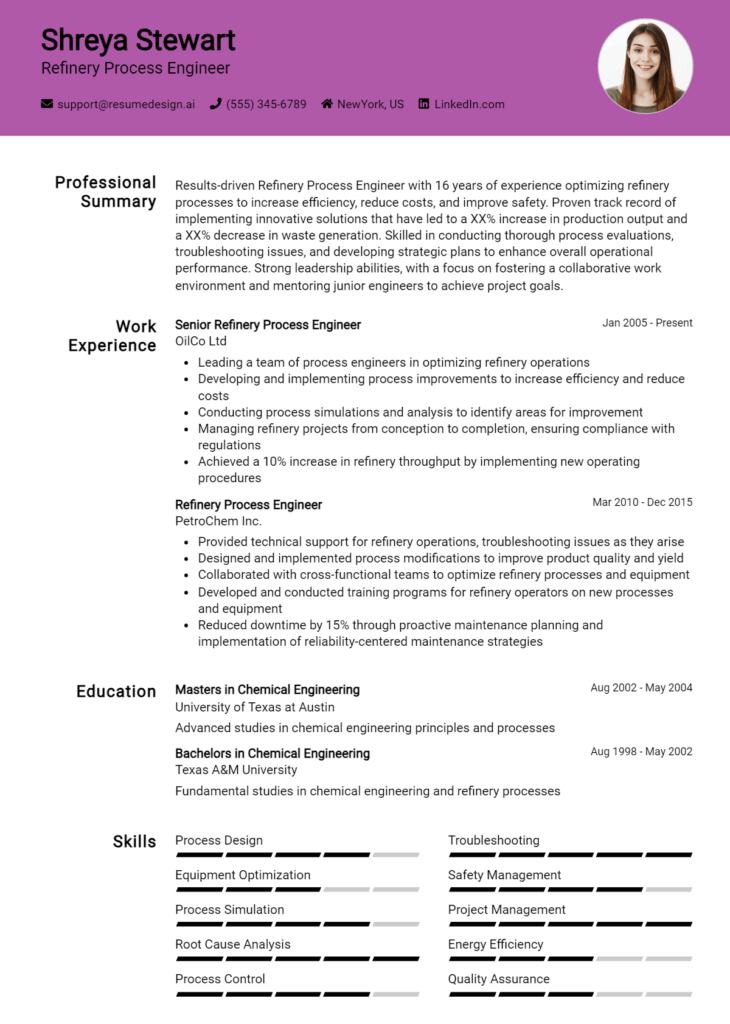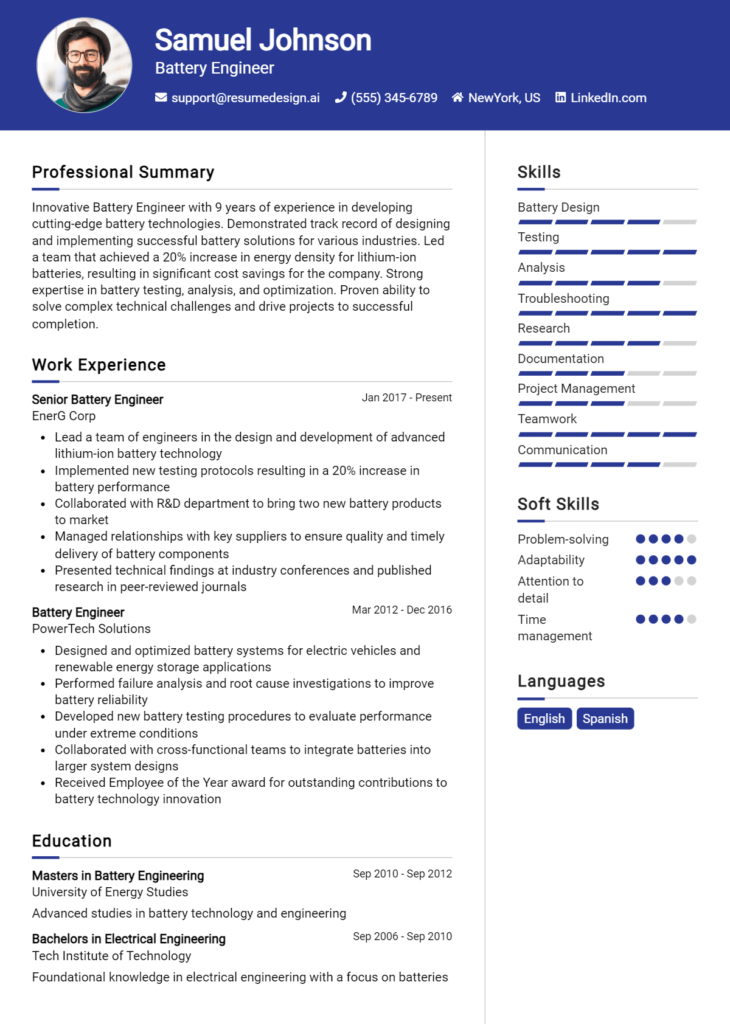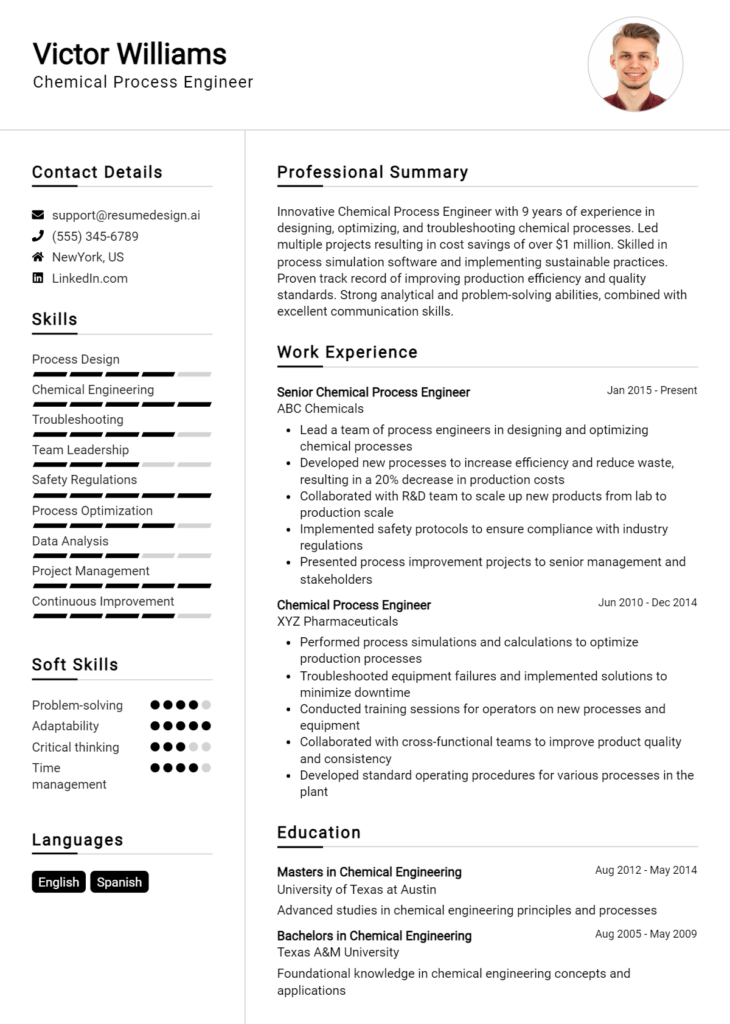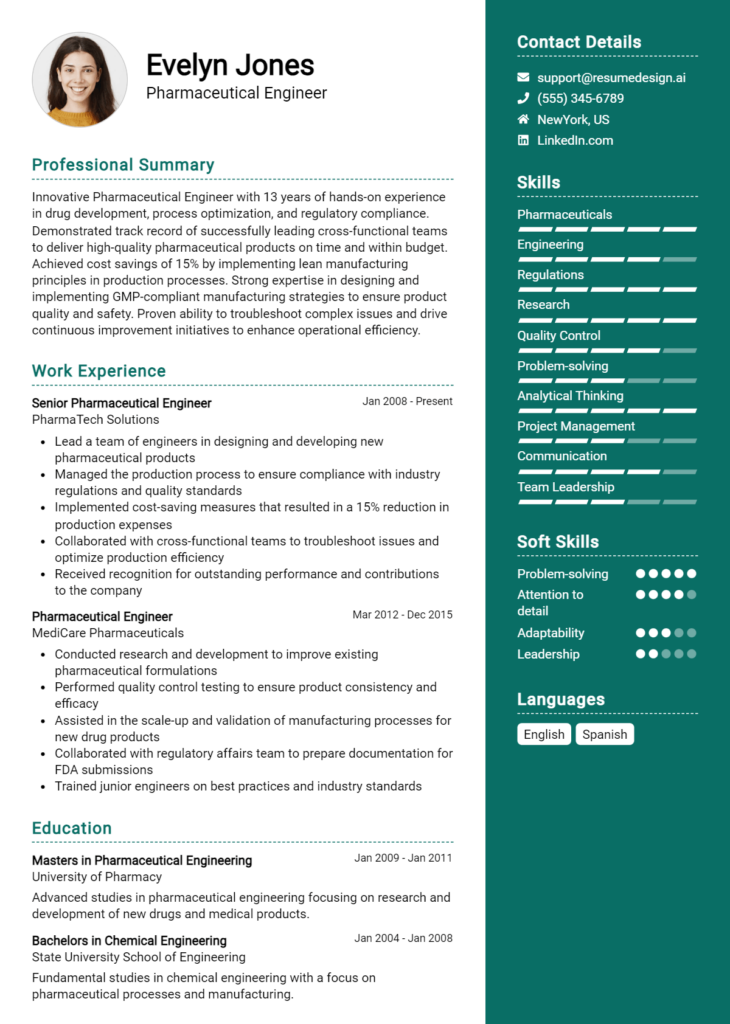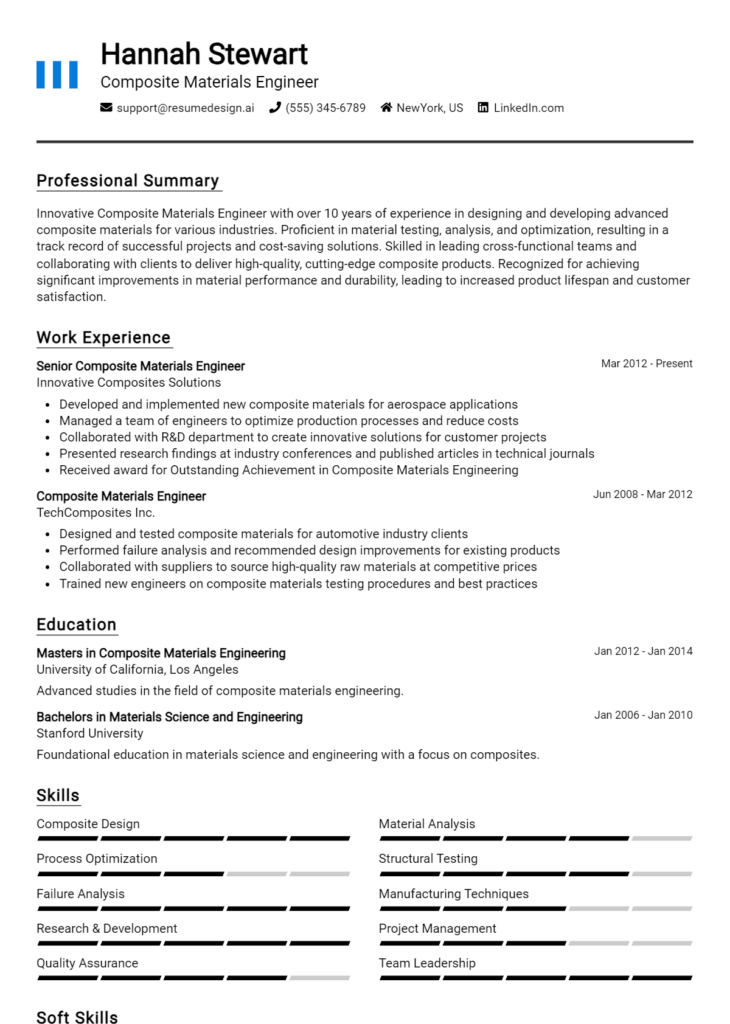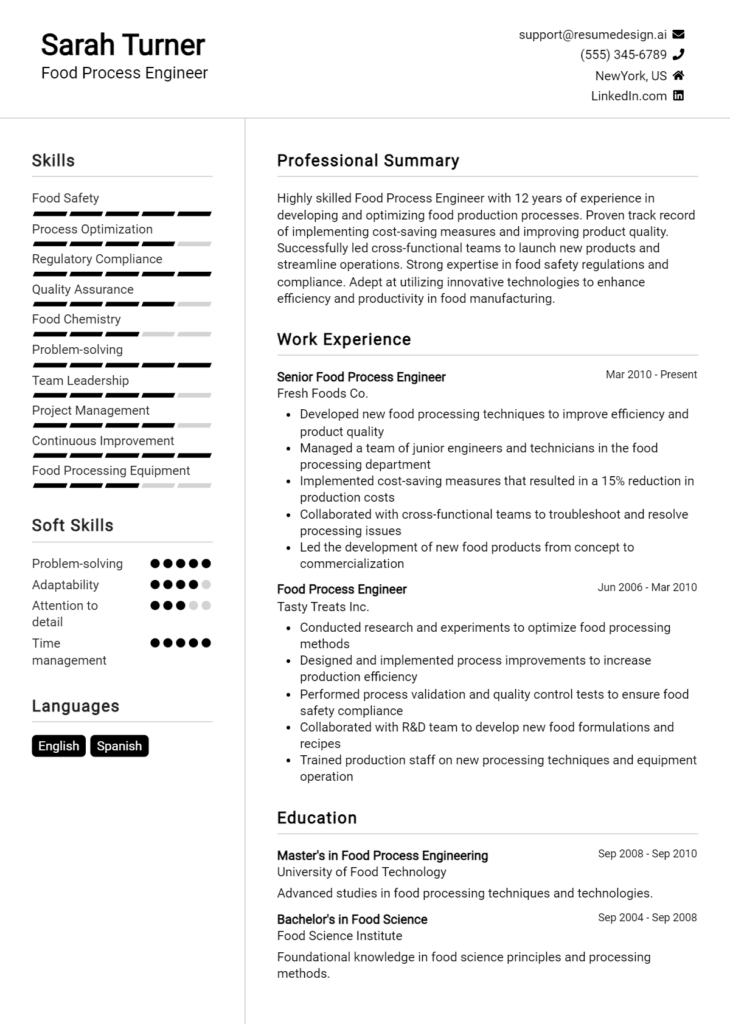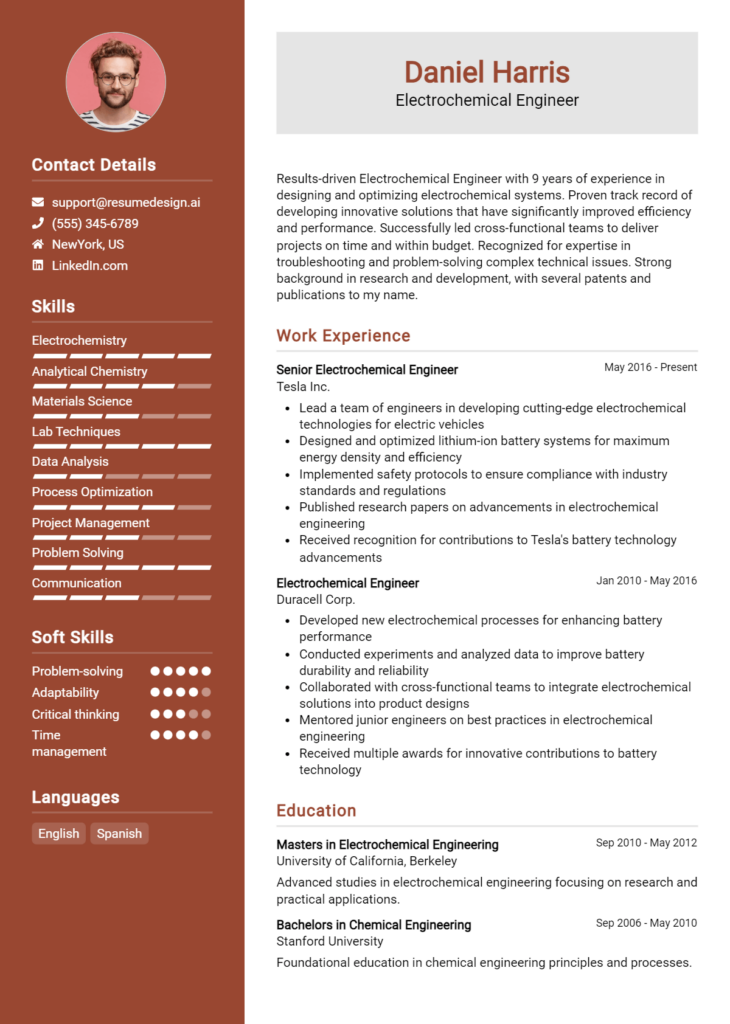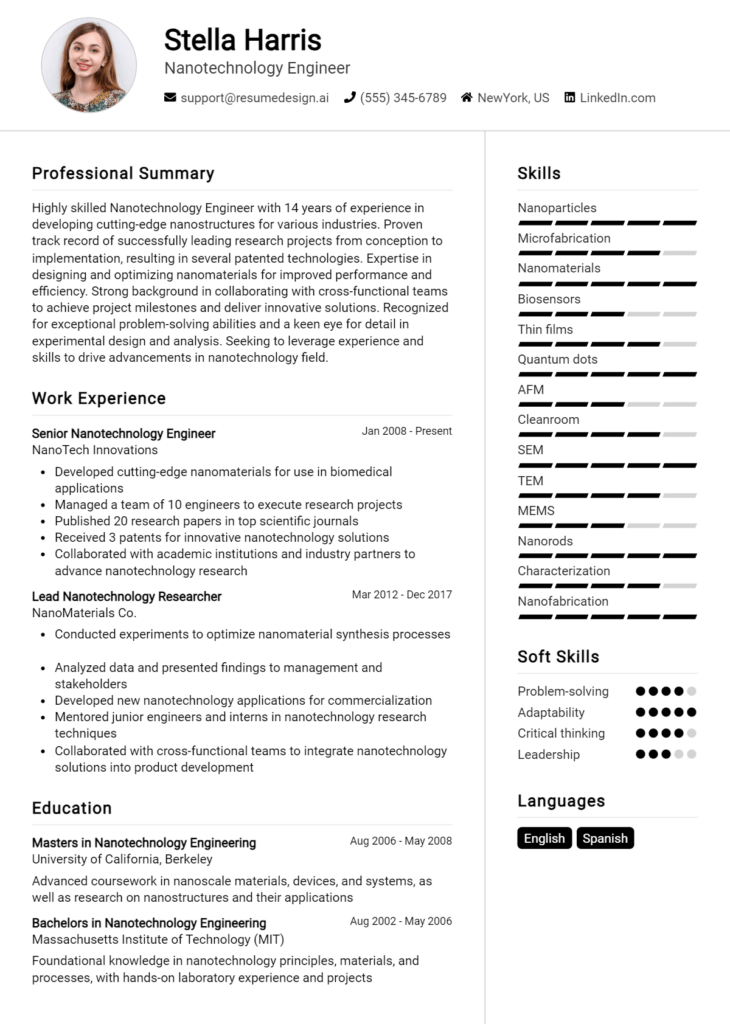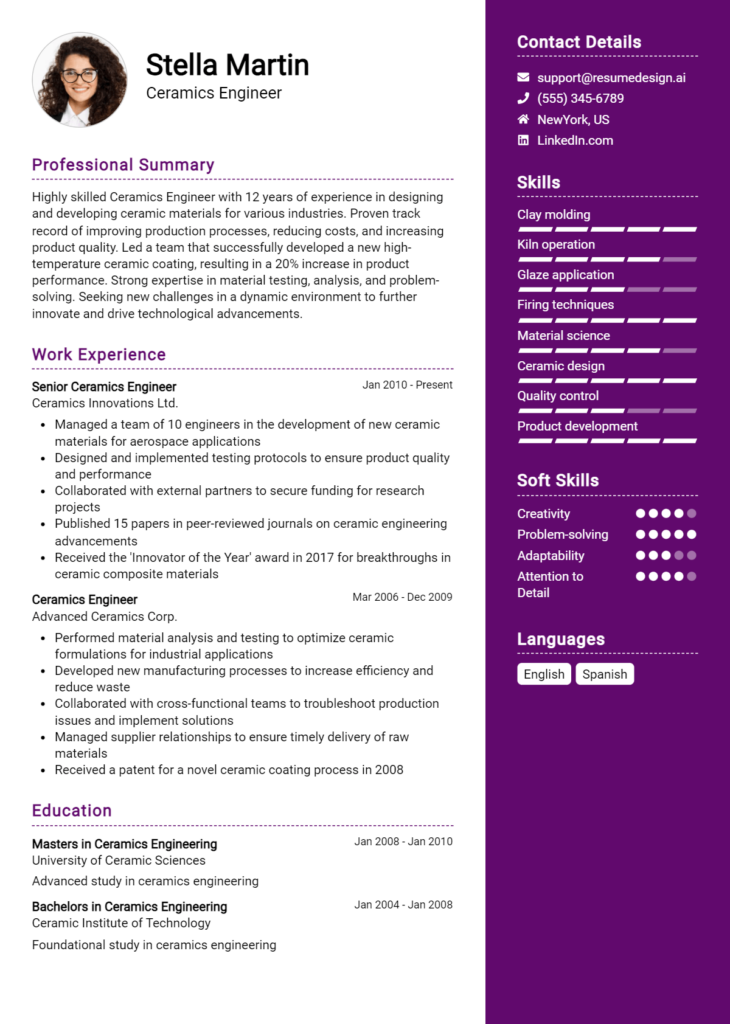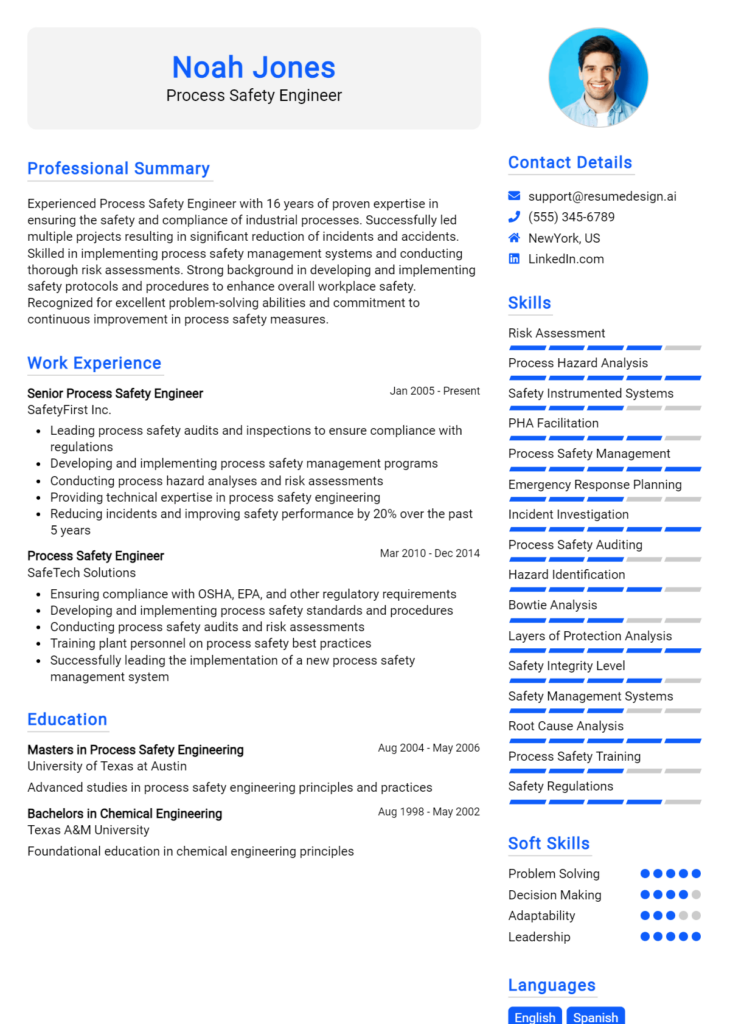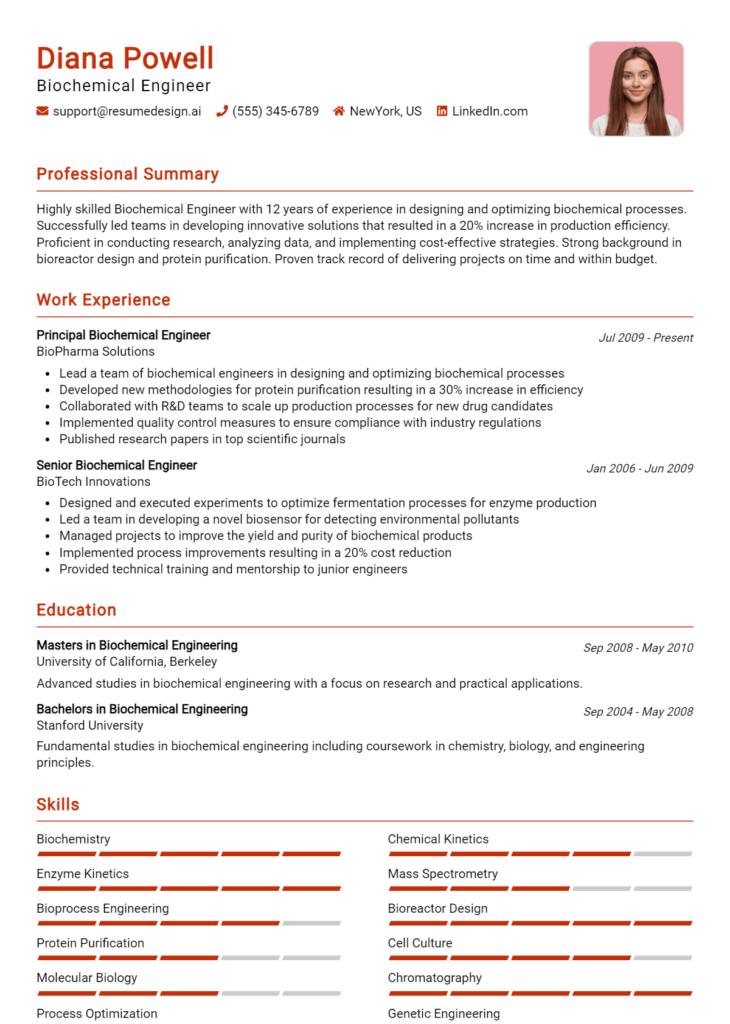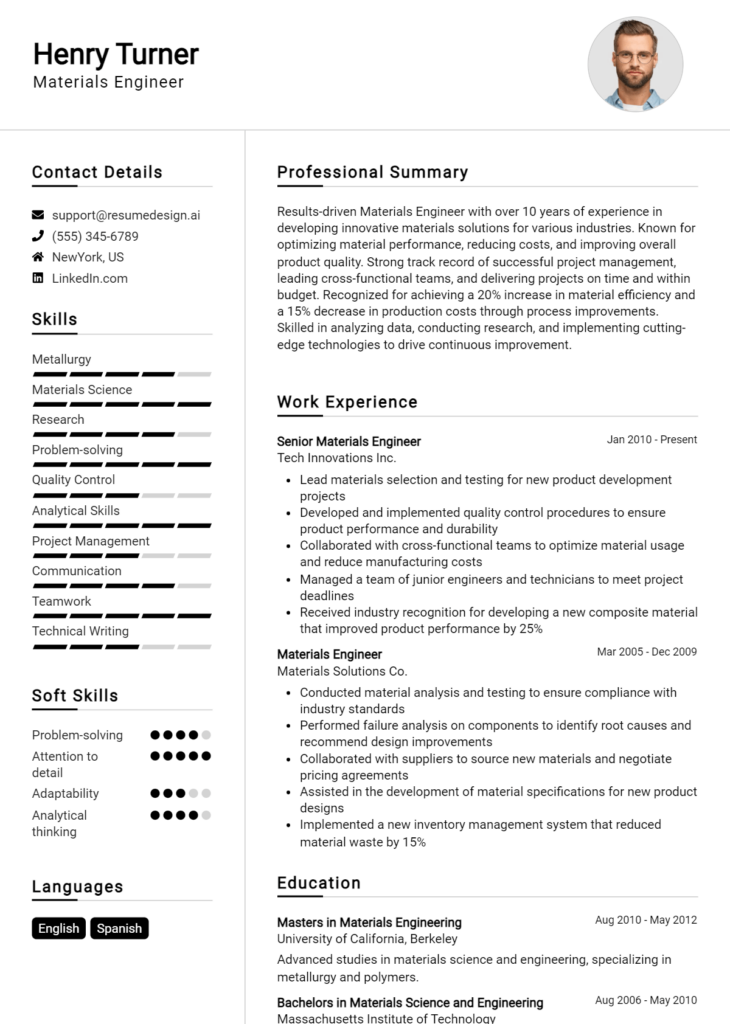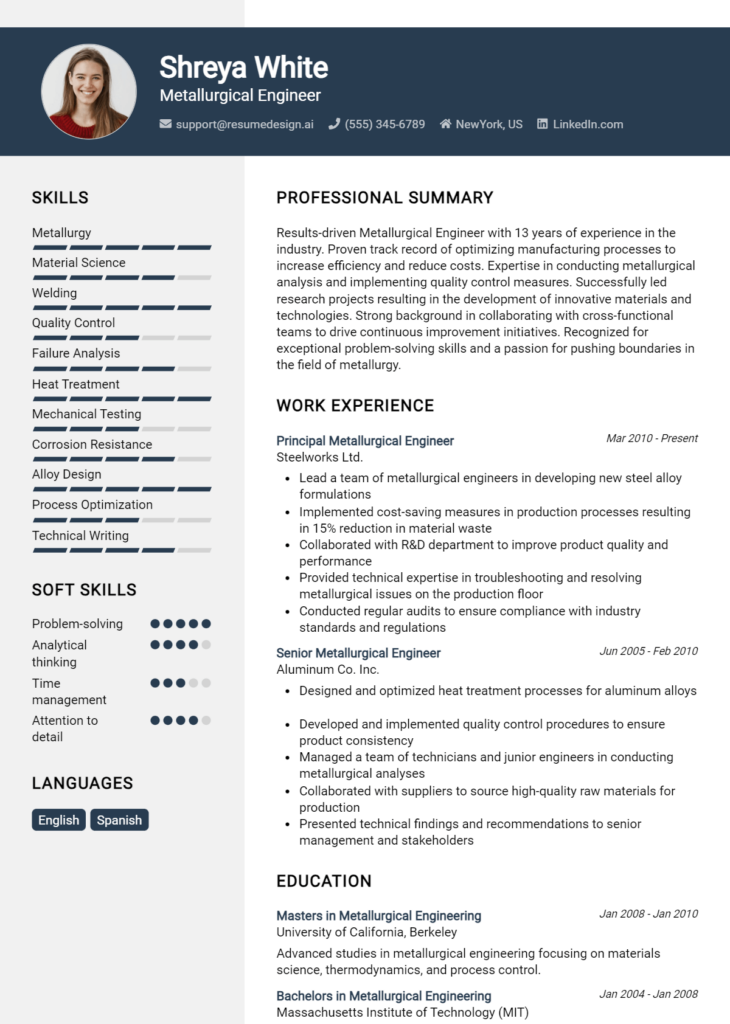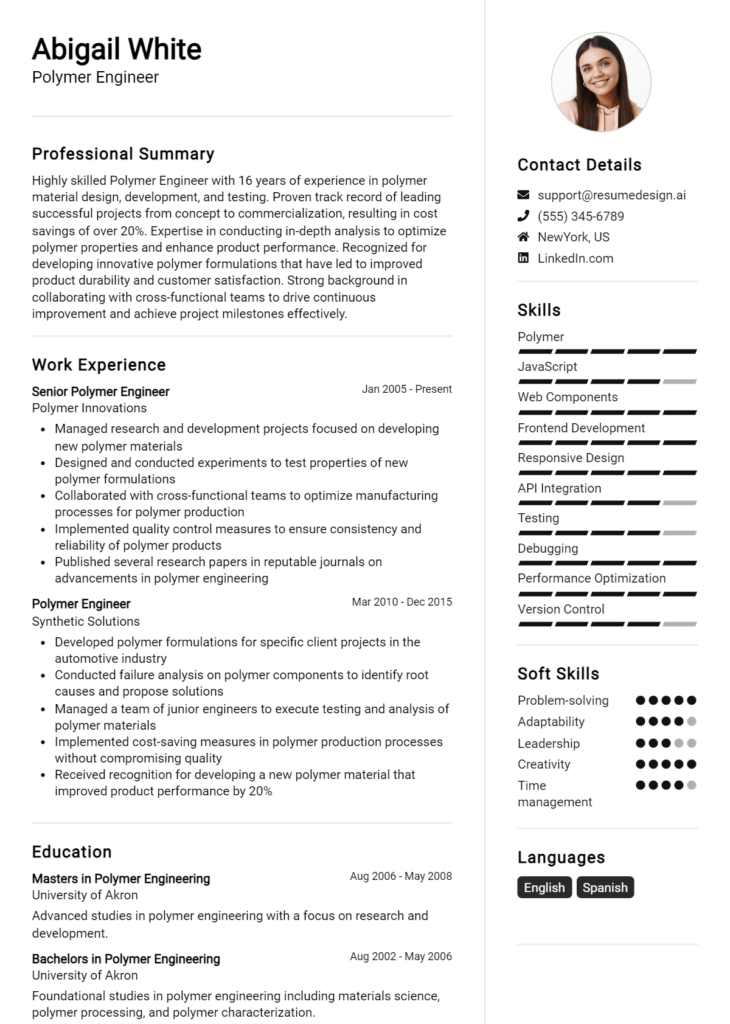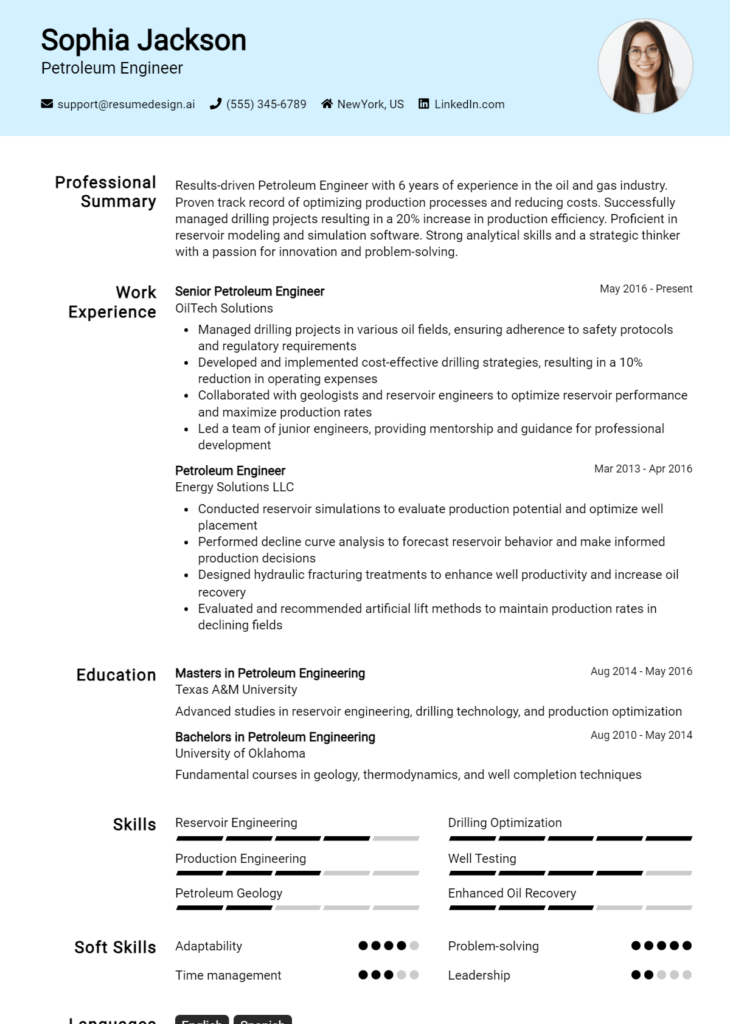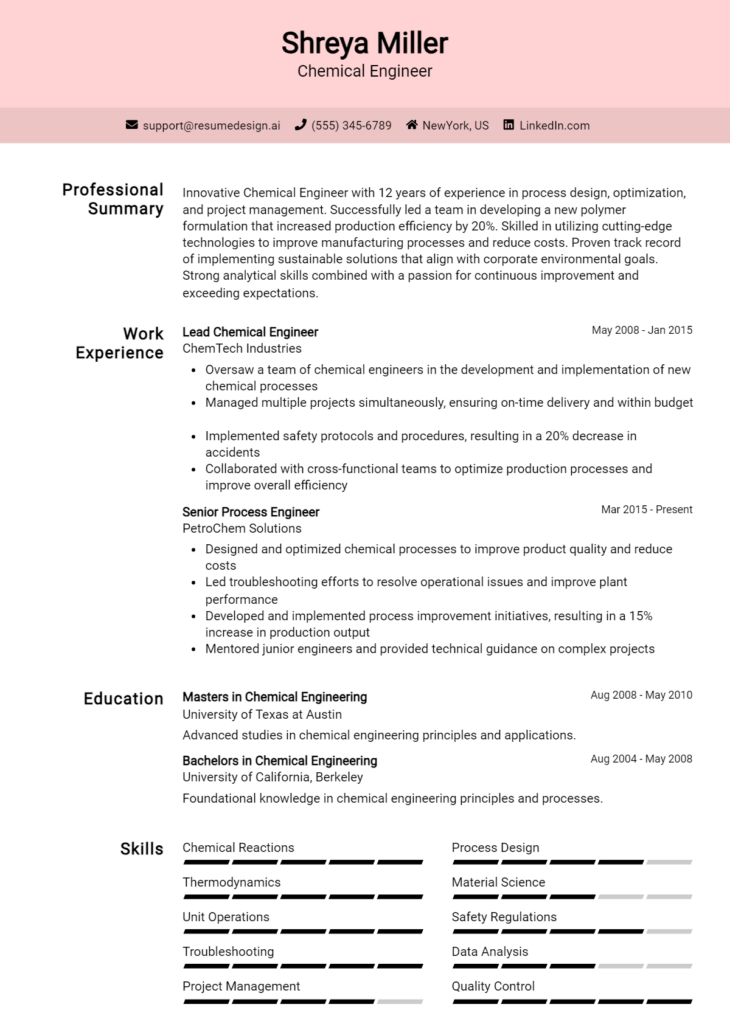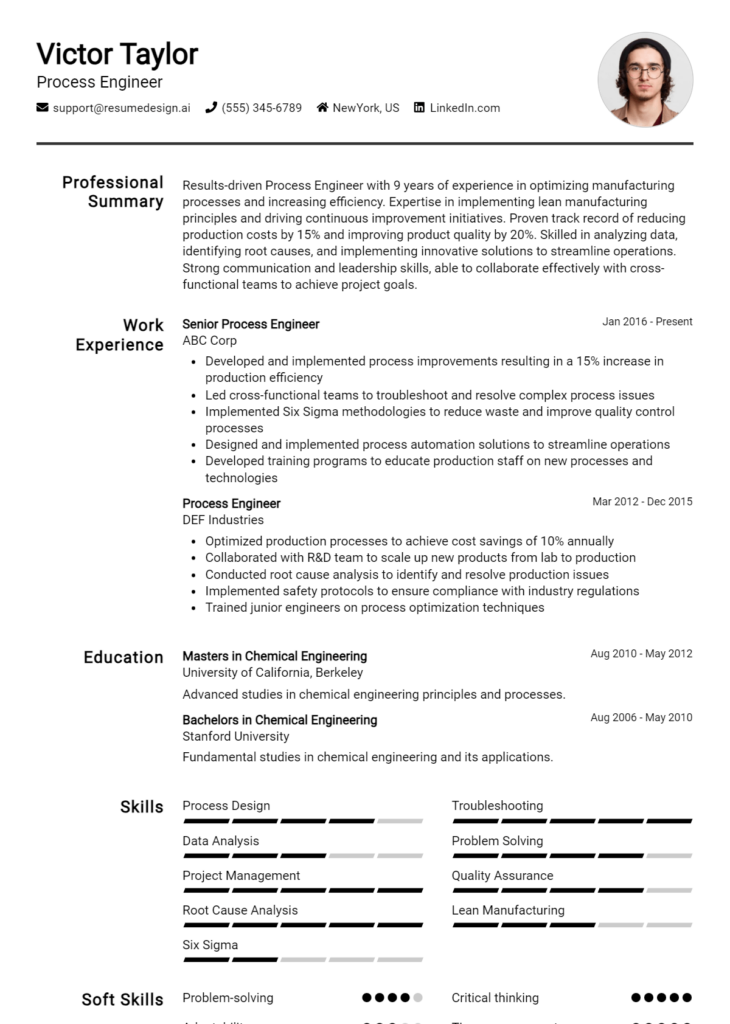Corrosion Engineer Core Responsibilities
A Corrosion Engineer is responsible for assessing and managing corrosion risks in various materials and structures, ensuring their longevity and safety. They collaborate with design, production, and maintenance teams to develop effective corrosion prevention strategies, requiring strong technical knowledge, operational insight, and exceptional problem-solving skills. These abilities are crucial for achieving organizational goals, as they enhance asset reliability and sustainability. A well-structured resume that highlights these competencies is essential for showcasing a Corrosion Engineer's qualifications.
Common Responsibilities Listed on Corrosion Engineer Resume
- Conduct corrosion assessments and material evaluations.
- Develop and implement corrosion control strategies.
- Analyze failure cases and recommend corrective actions.
- Collaborate with cross-functional teams on projects.
- Prepare detailed reports and documentation on findings.
- Conduct field inspections and testing of materials.
- Stay updated on industry standards and regulations.
- Provide training and support to operational staff.
- Utilize software tools for corrosion modeling and analysis.
- Manage budgets and timelines for corrosion projects.
- Advise on material selection and protective coatings.
- Participate in research and development of new technologies.
High-Level Resume Tips for Corrosion Engineer Professionals
A well-crafted resume is vital for Corrosion Engineer professionals, as it often serves as the first impression you make on potential employers. In a field where precision and expertise are paramount, your resume must effectively showcase your technical skills, relevant experience, and significant achievements. It is not just a list of past jobs; it should tell a compelling story of your career, reflecting your proficiency in corrosion management, materials science, and engineering principles. This guide will provide practical and actionable resume tips specifically tailored for Corrosion Engineer professionals, helping you stand out in a competitive job market.
Top Resume Tips for Corrosion Engineer Professionals
- Tailor your resume to the specific job description by using relevant keywords and phrases that align with the employer's requirements.
- Highlight your educational background, emphasizing degrees and certifications in materials science, engineering, or related fields.
- Showcase relevant experience in corrosion assessment, prevention strategies, and materials selection to demonstrate your expertise in the field.
- Quantify your achievements with specific metrics, such as cost savings from corrosion prevention measures or reductions in downtime due to effective maintenance strategies.
- Include industry-specific skills, such as knowledge of NACE certifications, cathodic protection systems, and corrosion testing methodologies.
- Utilize action verbs to describe your responsibilities and accomplishments, making your contributions clear and impactful.
- Incorporate technical tools and software you are proficient in, such as corrosion modeling software or data analysis tools.
- Consider adding a summary statement at the top of your resume that encapsulates your career highlights and professional goals.
- Ensure your formatting is clean and professional with clear headings, bullet points, and consistent font usage for easy readability.
By implementing these tips, you can significantly enhance your resume and increase your chances of landing a job in the Corrosion Engineer field. A well-structured and tailored resume not only showcases your qualifications but also demonstrates your commitment to professionalism and attention to detail, qualities that are highly valued by employers in this specialized industry.
Why Resume Headlines & Titles are Important for Corrosion Engineer
In the competitive field of engineering, particularly in specialized roles like a Corrosion Engineer, a well-crafted resume headline or title is crucial for making a strong first impression. A compelling headline serves as a powerful hook that can instantly grab the attention of hiring managers, succinctly summarizing a candidate’s key qualifications and unique selling points in just a few words. By presenting a concise and relevant title that directly relates to the job being applied for, candidates can effectively communicate their expertise and readiness for the role, setting the stage for a deeper evaluation of their credentials.
Best Practices for Crafting Resume Headlines for Corrosion Engineer
- Keep it concise: Aim for one impactful phrase that encapsulates your expertise.
- Be role-specific: Tailor your headline to reflect the specific position of Corrosion Engineer.
- Highlight key skills: Include your most relevant technical skills or certifications.
- Incorporate metrics: If possible, use numbers or specific achievements to quantify your experience.
- Use strong action words: Start with compelling verbs that convey your expertise and impact.
- Reflect industry terminology: Use language and terms that resonate within the corrosion engineering field.
- Make it unique: Differentiate yourself from other candidates to stand out in the hiring process.
- Update regularly: Revise your headline to reflect your most current qualifications and experiences.
Example Resume Headlines for Corrosion Engineer
Strong Resume Headlines
Experienced Corrosion Engineer with 10+ Years in Asset Integrity Management
Certified Corrosion Specialist with Proven Track Record in Mitigating Industrial Corrosion Risks
Results-Driven Corrosion Engineer Specializing in Advanced Coating Technologies
Innovative Corrosion Engineer with Expertise in Non-Destructive Testing and Analysis
Weak Resume Headlines
Engineer Seeking Job
Corrosion Engineer with Some Experience
Professional Looking for Opportunities
The strong headlines are effective because they clearly articulate the candidate's specialized skills and experiences, making them memorable and relevant to the hiring manager. They are specific and showcase the individual's expertise in corrosion engineering, thus immediately conveying value. In contrast, the weak headlines lack specificity and do not provide any insight into the candidate's qualifications, rendering them forgettable and unremarkable, which can result in missed opportunities for advancement in the application process.
Writing an Exceptional Corrosion Engineer Resume Summary
A well-crafted resume summary is crucial for a Corrosion Engineer, as it serves as the first impression a hiring manager gets of a candidate. This succinct paragraph quickly captures attention by highlighting the candidate's key skills, relevant experience, and notable accomplishments in the field of corrosion engineering. A strong summary not only communicates the candidate’s qualifications effectively but also demonstrates how they align with the specific role they are applying for. Therefore, it is essential that this section is concise, impactful, and tailored to meet the unique requirements of each job opportunity.
Best Practices for Writing a Corrosion Engineer Resume Summary
- Quantify Achievements: Use numbers and statistics to showcase your impact in previous roles.
- Focus on Key Skills: Highlight technical skills relevant to corrosion engineering, such as materials analysis and failure assessment.
- Tailor for the Job Description: Customize your summary to reflect the specific requirements and language of the job posting.
- Use Action Verbs: Start sentences with strong action verbs to convey confidence and proactivity.
- Highlight Relevant Experience: Mention specific projects or roles that directly relate to corrosion engineering.
- Keep it Concise: Aim for 2-4 sentences that effectively summarize your qualifications without overwhelming the reader.
- Showcase Certifications: If applicable, include relevant certifications or licenses that enhance your credibility.
- Emphasize Problem-Solving Skills: Highlight your ability to identify and address corrosion-related challenges effectively.
Example Corrosion Engineer Resume Summaries
Strong Resume Summaries
Results-driven Corrosion Engineer with over 8 years of experience in the oil and gas industry, successfully reducing corrosion-related failures by 30% through innovative materials assessment and monitoring techniques.
Detail-oriented professional with a Master’s degree in Corrosion Engineering, specializing in the development of anti-corrosive coatings that improved asset longevity by 25% for major infrastructure projects.
Experienced Corrosion Engineer with a proven track record of conducting over 100 corrosion assessments and implementing solutions that enhanced safety compliance by 40% in marine applications.
Skilled Corrosion Engineer with expertise in cathodic protection systems, having led a team that achieved a 50% reduction in maintenance costs across a fleet of pipelines.
Weak Resume Summaries
Corrosion Engineer with experience in various projects looking for a new opportunity.
Detail-oriented engineer with skills in corrosion management but no specific achievements or examples provided.
The examples of strong resume summaries effectively highlight specific achievements, quantify results, and demonstrate direct relevance to the role of a Corrosion Engineer. They provide clear evidence of the candidate's capabilities and contributions to previous employers. In contrast, the weak resume summaries lack specificity and measurable outcomes, making them less impactful and memorable to hiring managers. This distinction underscores the importance of crafting a summary that communicates value and differentiation in a competitive job market.
Work Experience Section for Corrosion Engineer Resume
The work experience section of a Corrosion Engineer resume is critical in demonstrating the candidate's technical skills, project management capabilities, and their ability to produce high-quality results in the field of corrosion engineering. This section serves as a platform to highlight specific achievements, showcasing how the candidate has effectively applied their expertise to solve complex corrosion issues, manage teams, and enhance product integrity. By quantifying achievements and aligning experiences with industry standards, candidates can provide concrete evidence of their contributions and value to potential employers.
Best Practices for Corrosion Engineer Work Experience
- Focus on quantifiable results, such as percentage improvements in corrosion resistance or cost savings achieved through innovative solutions.
- Highlight technical skills relevant to corrosion engineering, including knowledge of materials, coatings, and testing methods.
- Detail project management experience, including the size of teams managed and budget oversight.
- Include specific examples of collaboration with cross-functional teams to demonstrate teamwork and communication skills.
- Align experiences with industry standards and regulations to show familiarity with compliance requirements.
- Use strong action verbs to convey leadership and initiative in your roles.
- Be specific about the technologies and tools used in your work, showcasing your technical proficiency.
- Tailor your experience to the job description, ensuring relevance to the prospective employer's needs.
Example Work Experiences for Corrosion Engineer
Strong Experiences
- Led a team of 5 engineers in the design and implementation of a corrosion prevention strategy that reduced corrosion-related failures by 30% over two years.
- Implemented a new coating technology that decreased maintenance costs by 25%, resulting in a $100,000 annual savings for the company.
- Collaborated with a cross-functional team to develop and execute a comprehensive corrosion risk assessment for a major pipeline project, ensuring compliance with industry regulations.
- Managed a budget of $500,000 for corrosion testing and inspection projects, delivering results under budget while maintaining high-quality standards.
Weak Experiences
- Worked on corrosion-related projects that involved some testing and analysis.
- Assisted with various engineering tasks related to corrosion.
- Participated in team meetings and discussions about corrosion issues.
- Helped complete paperwork for corrosion projects.
The examples of strong experiences are considered effective because they clearly outline specific achievements with quantifiable outcomes, demonstrate technical leadership, and highlight collaboration within teams. In contrast, the weak experiences lack detail and measurable impact, making them less compelling to potential employers. Strong statements convey a sense of purpose and results, while weak statements are vague and fail to illustrate the candidate's contributions to their roles.
Education and Certifications Section for Corrosion Engineer Resume
The education and certifications section of a Corrosion Engineer's resume is crucial as it serves as a benchmark for a candidate's knowledge and expertise in the field. This section not only highlights the candidate's academic background but also showcases industry-relevant certifications and their commitment to continuous learning. By providing details on relevant coursework, specialized training, and recognized certifications, candidates can significantly enhance their credibility and demonstrate their alignment with the specific requirements of the job role.
Best Practices for Corrosion Engineer Education and Certifications
- Include degrees in relevant fields such as materials science, chemical engineering, or civil engineering.
- List certifications from recognized organizations such as NACE International or the Association for Materials Protection and Performance (AMPP).
- Detail any specialized training in corrosion prevention techniques or materials selection.
- Highlight coursework that pertains directly to corrosion engineering, such as electrochemistry or corrosion science.
- Be specific about the level of education achieved (e.g., Bachelor’s, Master’s, or Ph.D.).
- Include any relevant workshops, seminars, or continuing education courses taken to stay current in the field.
- Maintain a clear format that distinguishes between degrees, certifications, and training for easy readability.
- Update this section regularly to reflect the most current and relevant credentials.
Example Education and Certifications for Corrosion Engineer
Strong Examples
- Bachelor of Science in Materials Engineering, University of Michigan, 2019
- Certified Corrosion Technician (NACE), 2021
- Master’s in Corrosion Engineering, University of Alberta, 2022
- Coursework: Electrochemistry and Corrosion Science, 2020
Weak Examples
- Associate Degree in General Studies, Community College, 2015
- Certification in Basic Welding Techniques, 2018
- High School Diploma, 2010
- Outdated Corrosion Control Certification, 2010
The examples listed as strong demonstrate direct relevance to the role of a Corrosion Engineer, showcasing both advanced education and recognized certifications that are highly regarded in the industry. Conversely, the weak examples lack specificity and relevance to corrosion engineering, with qualifications that do not align with the technical requirements of the job or are considered outdated. This distinction highlights the importance of including pertinent and current educational credentials to enhance a candidate's profile.
Top Skills & Keywords for Corrosion Engineer Resume
The role of a Corrosion Engineer is critical in various industries, from oil and gas to construction, as they help safeguard assets and ensure the longevity of materials. A well-crafted resume for this position must highlight both hard and soft skills that demonstrate technical expertise, problem-solving abilities, and effective communication. These skills not only reflect a candidate's qualifications but also their capacity to contribute to a team and manage complex projects. Emphasizing the right skills can make a significant difference in capturing the attention of potential employers and securing an interview.
Top Hard & Soft Skills for Corrosion Engineer
Soft Skills
- Strong analytical thinking
- Effective communication
- Problem-solving abilities
- Team collaboration
- Attention to detail
- Time management
- Adaptability to change
- Project management
- Critical thinking
- Customer service orientation
- Conflict resolution
- Leadership skills
- Creativity in engineering solutions
- Negotiation skills
- Safety awareness
Hard Skills
- Knowledge of corrosion mechanisms
- Proficiency in corrosion testing techniques
- Experience with materials selection and evaluation
- Familiarity with coatings and corrosion inhibitors
- Expertise in failure analysis
- Understanding of cathodic protection systems
- Proficient in computer modeling and simulation software
- Data analysis and interpretation
- Compliance with industry standards (e.g., NACE, SSPC)
- Laboratory skills for corrosion testing
- Proficiency in engineering software (e.g., AutoCAD, MATLAB)
- Knowledge of welding and fabrication processes
- Experience in field inspections and assessments
- Understanding of environmental impacts on corrosion
- Technical report writing
- Quality control and assurance practices
- Risk assessment and management
For more insights on enhancing your resume, including how to effectively showcase your skills and work experience, consider exploring resources that can help you stand out in the competitive job market.
Stand Out with a Winning Corrosion Engineer Cover Letter
Dear [Hiring Manager's Name],
I am writing to express my interest in the Corrosion Engineer position at [Company Name] as advertised on [where you found the job posting]. With a strong background in materials science and a deep understanding of corrosion mechanisms, I am confident in my ability to contribute effectively to your team and help advance your corrosion management initiatives. My hands-on experience with corrosion testing and analysis, coupled with my passion for developing innovative solutions, makes me a suitable candidate for this role.
In my previous position at [Previous Company Name], I successfully led several projects focused on assessing and mitigating corrosion-related failures in various industrial settings. By implementing advanced corrosion monitoring techniques and conducting thorough risk assessments, I was able to reduce the maintenance costs by over 30% while enhancing the overall lifespan of critical infrastructure. My proficiency in utilizing software for corrosion modeling and predictive maintenance has allowed me to make data-driven decisions that align with organizational goals. I am excited about the opportunity to bring this expertise to [Company Name] and contribute to your commitment to safety and sustainability.
I am particularly drawn to this opportunity at [Company Name] because of your dedication to innovation and excellence in engineering practices. I admire your recent projects, especially [mention any specific project or initiative of the company], and I am eager to collaborate with your talented team to develop cutting-edge strategies for corrosion prevention and control. I am confident that my proactive approach and analytical mindset will complement the existing skills within your department.
Thank you for considering my application. I look forward to the opportunity to discuss how my background, skills, and enthusiasms align with the goals of [Company Name]. I am excited about the possibility of contributing to your team and am available for an interview at your earliest convenience.
Sincerely,
[Your Name]
[Your Phone Number]
[Your Email Address]
Common Mistakes to Avoid in a Corrosion Engineer Resume
When crafting a resume for a Corrosion Engineer position, it's essential to present your skills and experiences effectively to stand out in a competitive job market. However, many candidates make common mistakes that can undermine their qualifications or lead to misunderstandings about their expertise. Avoiding these pitfalls will help you create a strong, professional resume that accurately reflects your abilities and aligns with the expectations of potential employers.
Lack of Specific Technical Skills: Failing to include specific corrosion-related skills, such as knowledge of corrosion prevention methods, coating applications, and cathodic protection, can make your resume less appealing to hiring managers.
Vague Job Descriptions: Using general terms to describe previous job roles can leave employers unsure of your actual contributions. Instead, provide clear, quantifiable achievements that demonstrate your impact in previous positions.
Ignoring Relevant Certifications: Not mentioning important certifications, such as NACE certification or other industry-recognized qualifications, can diminish your credibility and show a lack of commitment to your professional development.
Omitting Industry-Specific Keywords: Many companies use Applicant Tracking Systems (ATS) to filter resumes. Failing to include relevant keywords from the job description can result in your resume being overlooked.
Overloading with Irrelevant Experience: Including unrelated work experiences can dilute your resume. Focus on positions and projects that specifically relate to corrosion engineering to showcase relevant expertise.
Poor Formatting and Structure: A cluttered or overly complex resume can be hard to read. Use clear headings, bullet points, and a consistent format to enhance readability and professionalism.
Neglecting Soft Skills: While technical skills are critical, overlooking soft skills such as communication, teamwork, and problem-solving can leave an incomplete picture of your capabilities as a corrosion engineer.
Failure to Tailor the Resume: Sending a generic resume for every application can be detrimental. Tailor your resume to highlight the skills and experiences that align with the specific job requirements and company culture.
Conclusion
As a Corrosion Engineer, your expertise is crucial in ensuring the longevity and safety of structures and materials subjected to harsh environments. This article has explored the various aspects of the role, including the importance of understanding corrosion mechanisms, selecting appropriate materials, and implementing effective prevention strategies. We’ve also discussed the significance of staying updated on industry standards and advancements in corrosion testing technologies.
To enhance your career prospects, it's essential to have a polished and professional resume that showcases your skills and experience effectively. Take a moment to review your Corrosion Engineer resume, ensuring it highlights your technical expertise, project accomplishments, and relevant certifications.
Utilize the available resources to help you stand out in the job market. Check out the resume templates for a structured format, use the resume builder for an easy and customizable approach, and explore resume examples for inspiration. Don’t forget to craft a compelling cover letter with our cover letter templates to complement your resume.
Act now and give your resume the attention it deserves to pave the way for your next career opportunity in corrosion engineering!

